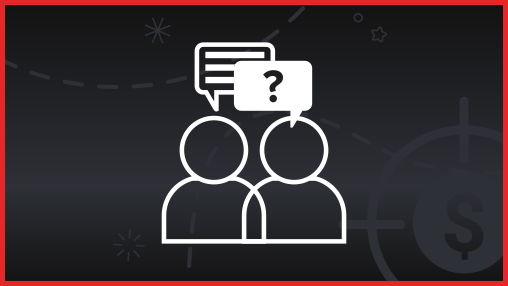When considering outsourcing your lead generation, selecting the appropriate partner is not just imperative—it’s critical for fueling your sales pipeline and enhancing your ROI. Without vetting potential vendors, there’s a tangible risk of allocating budget towards low-quality leads, affecting your sales funnel. This risk highlights the critical value of lead gen in not only sustaining but accelerating your business growth through the acquisition of high-quality, sales-ready leads.
Therefore, dedicating time to thoroughly evaluate potential partners is key. By asking the right questions, you’ll be able to identify which vendors not only understand the core of your business but also possess the expertise required to navigate the complexities of B2B lead generation.
Defining the type of lead generation service needed
Defining the type of lead generation service needed is crucial for aligning expectations and goals. Here are some key questions to ask potential partners:
- Services offered: Inquire about the range of services available and whether custom packages are offered to suit specific needs
- Industry focus: Understand if their lead generation strategies and use of intent data are tailored to specific industries. Request examples of successful targeting across various sectors
It’s essential to be clear about the type of leads required. Specify whether you’re seeking sales inquiries, content downloads, event sign-ups, demo requests, or other specific outcomes to define the end goal effectively.
Lead sourcing and quality
Lead generation companies use various methods to source and qualify leads before delivering them to clients. Understanding where your leads are coming from and how they are filtered is crucial for ensuring you receive high-quality contacts tailored to your business needs.
Some common lead sources include:
- Inbound tactics like content marketing, SEO, and social media to attract visitors who convert into leads through calls-to-action
- Content syndication via B2B communities, email newsletters and publisher websites
- Outbound prospecting via email, cold calling, direct mail to engage potential customers
- Paid channels like pay-per-click ads, sponsorships, and digital promotions to drive traffic
- Third-party lead lists purchased from data brokers, list vendors
- Events like webinars, trade shows, and conferences where leads can be captured
Reputable vendors should clearly explain their lead sourcing strategies and the mix of channels used. Be wary of companies that rely too heavily on outdated or spammy tactics.
The lead qualification process typically involves:
- Verifying contact details are accurate and up-to-date
- Scoring leads based on demographics, behaviors, interests, and other attributes
- Assessing lead readiness through surveys, quizzes, or other profiling methods
- Prioritizing and segmenting leads for follow-up by sales teams
- Removing unqualified leads that don’t match your customer profile
Ask vendors about their qualification criteria and ideal customer profiles. You want leads that closely align with your target audience and have been pre-vetted for sales readiness. Clarify how personalized the process is for your specific needs.
Pricing and contracts
When evaluating lead generation companies, it’s crucial to understand their pricing models and contract terms to ensure there are no surprises. There are a few common pricing models to be aware of:
- Cost per lead – You pay a fixed fee for each qualified lead generated, whether or not it leads to a sale. This model transfers the risk to the vendor, compelling them to deliver results
- Retainer – This involves a flat monthly fee for a predetermined number of leads each month. You pay the same amount consistently, regardless of the actual lead volume received
- Commission – Under this model, the vendor earns a percentage commission on any sales generated from the leads they provide. This helps to align incentives between you and the vendor
- Hybrid – A combination of the models mentioned above, often including a small retainer fee plus a commission on closed sales. This model provides flexibility in pricing and compensation
Be sure to understand exactly what factors determine cost under any model – lead quality, industry, source, qualification level, exclusivity. Try to negotiate discounted rates for higher lead volumes.
Discuss what happens if leads don’t convert at expected rates – will unused leads roll over month to month? Are there any refunds or discounts? Get any pricing agreements formalized in a contract.
Define lead ownership terms. Many providers resell unused leads, which brings risks. Try to negotiate exclusive leads that aren’t resold to competitors.
Review contract lengths, early termination fees, and renewal terms. Avoid being locked into long contracts if the partnership underperforms.
B2B targeting and segmentation
One of the most important factors in lead generation success is properly defining and targeting your ideal customer profile (ICP). The right lead gen partner will have in-depth expertise in analyzing your current customers and prospects to identify common patterns and attributes. This allows them to go after net new leads that closely match your ICP.
Key questions to ask:
- What profiling methods do you use to understand our target customer segments?
- How will you ensure the leads match our ICP based on demographics, firmographics, behaviors, and technographics?
- Can you provide a sample target account list or persona you would use?
- How will you avoid wasting budget on leads that don’t fit our customer profile?
- How often will you refresh and optimize the targeting as our ICP evolves?
- What is your approach if certain segments underperform?
The lead gen company should demonstrate a clear understanding of your target customer and have strategies in place to consistently pursue and engage prospects that are a strong fit. This alignment is crucial for delivering leads that convert at a high rate and maximize the return on your investment.
Sales and CRM integration
A lead generation company should integrate seamlessly with your existing CRM and sales workflows. This ensures proper handoff of qualified leads to your sales team. Here are some key questions to ask:
Aligning with your workflow
- How will they map their process to your sales workflow and funnel stages?
- Do they customize the integration based on your sales methodology?
- Will they sync lead data and activities back to your CRM in real time?
Setting up behavioral triggers
- Can they set up automation based on lead behaviors like email opens/clicks?
- Will they notify your sales reps when a lead hits specific qualification criteria?
- Can they trigger alerts in your CRM when a lead visits key pages on your site?
Handoff rules
- How will they define a “sales ready” lead to hand off to your team?
- Can you customize the lead score threshold for handoff to sales?
- Will all lead data and history transfer over with each handoff?
- Can they automatically notify reps when they receive new leads?
Proper integration ensures your sales team can pick up leads seamlessly to contact at the right time. Make sure to align workflows, set behavioral triggers, and define handoff rules upfront.
Reporting and analytics
Robust reporting and analytics should be a key deliverable from any lead generation partner. You’ll want visibility into how the leads are performing through detailed reports on essential KPIs and metrics. This allows you to track ROI and optimize future efforts.
Key questions to ask potential partners:
- What dashboards, reports, and analytics will be provided? Get specifics on frequency, depth, and format
- How will you track lead quality, response rate, sales velocity, and downstream conversion events?
- What are your standard KPIs for measuring campaign and lead gen success?
- How can reports be customized to my business goals and desired metrics?
- How quickly can I access and analyze results from a campaign?
- Will you make recommendations for optimizing future efforts based on results and insights?
- Can data and reporting integrate with my sales and marketing platforms?
Make sure lead sources, campaign details, and key metrics can be tracked throughout the buyer’s journey. This end-to-end visibility, from lead to customer, is essential for calculating ROI and revenue contribution of your lead gen programs.
Compliance and data security
When partnering with a lead generation company, it’s crucial to vet their data privacy and security practices. You’ll be trusting them with prospect contact information, so you need to ensure it will be properly protected and handled legally and ethically.
Key questions to ask:
- How does the company stay compliant with privacy regulations like GDPR and CCPA? Do they have a dedicated team or staff focused on this?
- What is their process for obtaining consent when contacting prospects?
- How do they ensure data is only used for agreed-upon purposes?
- Is data encrypted in transit and at rest? What cybersecurity protections do they have?
- How is data access controlled? Do they offer role-based access and minimization principles?
- What breach notification and response plans are in place if data is compromised?
- How long is data retained? Is there an automated deletion process when no longer needed?
- Can the company provide their data protection policy and any certifications (e.g. ISO 27001) on request?
- What audit logs and transparency reporting can they share?
Vetting a vendor’s security and compliance posture reduces risk while building trust. Look for GDPR readiness, encryption protocols, access controls, and breaches transparency. Reputable lead generation partners will welcome such due diligence.
Expertise and references
When evaluating a lead generation company, it’s important to understand their experience and track record of success.
Request relevant case studies
Case studies allow you to see specific examples of how the company has helped other clients generate and convert leads. Make sure to request case studies for companies in your industry or niche, at a similar stage of growth, and with comparable goals. Seeing their strategy and results for a client facing similar challenges to yours will help you ascertain if their approach is a good fit.
Ask for client references
Speaking directly with the lead generation company’s current or past clients can provide invaluable perspective. Some key questions to ask client references include:
- How long did you work with the company?
- What were your goals and did they meet expectations?
- How many leads did they provide and what was the quality?
- How responsive was their team to feedback and requests?
- Would you recommend them to other businesses like ours? Why or why not?
Hearing first-hand reviews from companies the vendor has worked with will help you determine if they have the requisite experience to meet your needs.
Look for specialized industry knowledge
Choose a lead generation company that has extensive familiarity with your specific industry. They will understand your target audience, market conditions, lingo, pain points and challenges. This enables them to create targeted and effective campaigns. Ask about their background serving businesses in your niche to assess if they have the right expertise.
Competitive landscape and differentiators
Understanding the competitive landscape is key when evaluating lead generation companies. You’ll want to assess how their offerings and approaches differ from alternatives.
Some questions to ask:
- What sets your processes apart from competitors?
- Do you specialize in specific industries, campaign types, or lead channels?
- Can you share benchmark data on your performance versus competitors?
- Are there any innovative features that make your platform stand out?
- How do you stay on top of lead gen industry trends and evolve along with them?
- Do you have a unique approach to lead nurturing and sales handoffs?
- What do client surveys or reviews reflect about your service versus alternatives?
- How do your pricing and contract structures compare?
- Can you share case studies demonstrating superior performance versus other vendors?
Thoroughly vetting their competitive positioning will help reveal if a company truly stands out from the pack. The differentiators you uncover can make all the difference in choosing the right partner.
Growth potential and scalability
When vetting a lead generation company, it’s important to understand their capabilities to scale campaigns up or down as your needs change. You’ll want to ask questions like:
- How easily can you ramp up lead volume if demand increases rapidly? Do you have reserved capacity to handle surges?
- What is the maximum number of leads you can realistically deliver per month? Do you have thresholds where pricing and SLAs would change?
- If our budgets shrink or demand drops, can you smoothly scale back while still providing quality? What is the minimum engagement you’ll accept?
- How do you ensure consistent quality and performance if rapidly scaling output volume? Do you have redundancies built in?
- For enterprise clients with multiple campaigns, how do you manage resources across accounts?
- Do you rely solely on technology or do you have flexible human capital resources as well?
- How do you foresee our relationship evolving over the next 1-3 years? What growth trajectory is realistic?
A mature lead generation partner should have the processes and infrastructure to dynamically scale up and down to match your evolving lead requirements. Make sure they don’t overpromise, but also have plenty of dry powder to ramp up if your company’s growth accelerates. Having reserved, scalable resources and clear pricing thresholds demonstrates long-term relationship orientation.
Why work with a trusted lead gen partner like Inbox Insight
Selecting the right lead generation partner is crucial for maximizing your B2B sales efforts. Our lead generation services use intent data to accurately identify accounts with the highest potential. We strategically deploy targeted digital advertising to engage key channels and integrate content syndication to establish effective connections with decision-makers.
We emphasize the importance of high-quality leads by customizing our approach for precision and adaptability, ensuring alignment with your specific ICP. We offer detailed metrics and analytics, providing total transparency and a measurable ROI.
Choose our data-driven lead generation strategies to accelerate your B2B sales growth.






